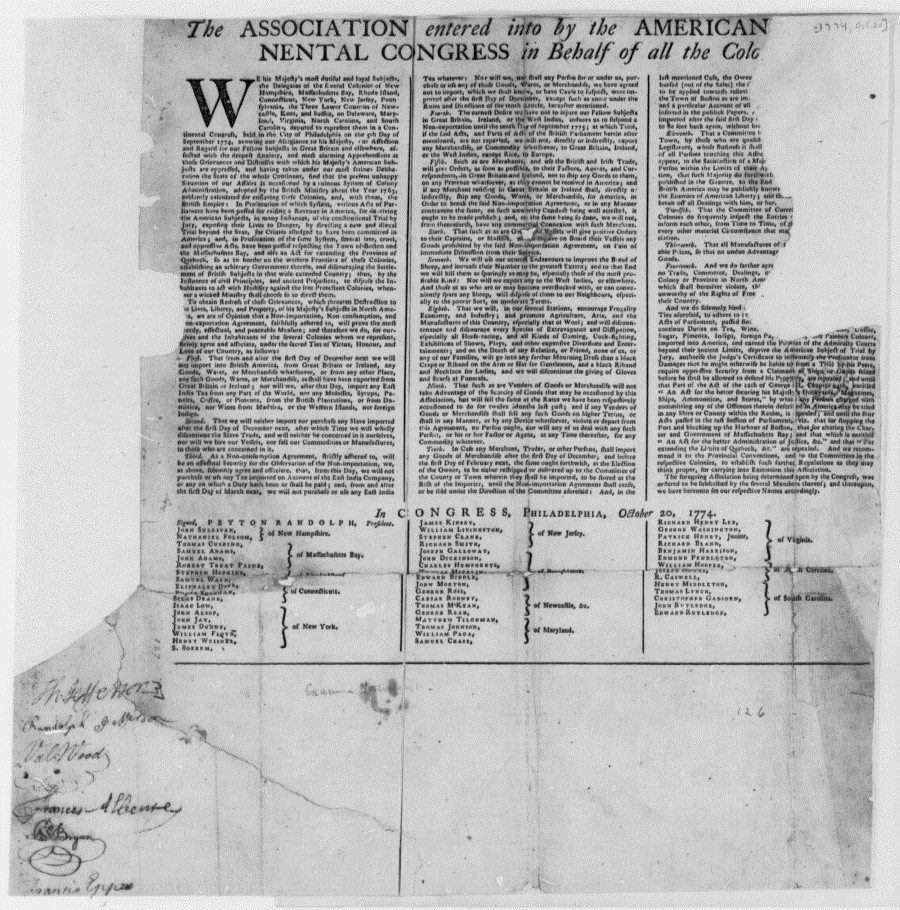 In the years before 1776, when the American Revolution broke out, the various governments of the colonial states of America made efforts to counter the exploitive economic policies of the British government. One result of those efforts was the Continental Association.
In the years before 1776, when the American Revolution broke out, the various governments of the colonial states of America made efforts to counter the exploitive economic policies of the British government. One result of those efforts was the Continental Association.
This act was created by the First Continental Congress in 1774, two years before full-blown war broke out between the newly declared United States and Great Britain.
As a Boycott
In effect, the Continental Association was a boycott against all products of British origin. It was an effective ploy because it cost the British government dearly in economic trade. On the other hand, it did nothing to improve relations between Britain and its American colonies – even though war was probably inevitable anyway.
The Continental Association was actually an attempt by some incredibly intelligent people – such as Thomas Jefferson, George Washington and John Adams – to teach the British a lesson without having to go to war with them.
British Countermeasures
However, the British fought back with their own economic sanctions: The New England Restraining Act of 1775. What this did was forbid New Englanders, especially those of Massachusetts, to trade with anyone but England. They were also barred from fishing for cod in the North Atlantic, cutting off the New Englanders’ trade with countries such as France, Spain, the Netherland and others. This was a huge economic loss for the colonies.
When members of the British Parliament learned that other states besides Massachusetts had signed on to the Continental Association, they countered by extending the restrictions of the New England Restraining Act to them as well.
Enforcement Meant Violence
The actual implementation of the Continental Association was not merely a matter of bureaucratic refusal to take orders and buy things from England. Enforcing it often meant acts of war and violence. It meant British ships intercepting American vessels, making arrests, and occasionally shooting people. But it also required the cooperation of ordinary people on the street. For example, it meant going without tea at all, for example, if the only available tea in the supply store was a British product.
Interestingly, many colonists who were later to side with Britain in the Revolutionary War had previously signed the Continental Association, such as Joseph Galloway, who was Speaker of the House of the Pennsylvania Provincial Assembly. Galloway was a proud American — yet felt the colonies should remain loyal to the Crown. Again, many saw this as an attempt to avoid war. Unfortunately, the British were unwilling to yield even an inch. For them, granting certain rights or reducing taxes on the colonies meant very significant losses in revenue and a stinging blow to the British economy.
The United Colonies
Today it’s not likely that the average American citizen is familiar with the Continental Association, yet this union of action on behalf of the original 13 colonies was nothing less than the precursor to the formation of the United States itself.
Almost a century later, President Abraham Lincoln made reference to the Continental Association in his first inaugural address as President in 1861. He said that it was, in many ways, the blueprint for the Declaration of Independence. Lincoln said the action “matured” the colonies toward becoming an independent nation.